ONE can often judge a society or community not by its wealth or status, but by how it treats those who find themselves at the bottom in its hierarchy. And there are few more divisive issues than how we treat those who have broken the law.
The old-fashioned cries of ‘lock them up and throw away the key’ start to ring hollow, however, when you see the results that can be achieved through rehabilitation programmes such as the Enhanced Combination Order and, in our own case, our Extern Works programme.
Extern began life over 40 years ago to help those coming out of prison who had little to no options of moving on with their lives. And today we also support young people and families, and people living with mental health issues, homelessness and problem drug and alcohol use, and more. But always underlying all of that work is the belief that a second chance changes lives.
We understand that circumstances and environment play a huge role in a person’s situation and life choices and we believe that giving offenders positive options is ultimately the best path for those individuals and for society as a whole.
Working with what’s called a ‘low threshold’ approach – in short, we offer our services to anyone, regardless of their past - Extern Works continues to provide training and employability opportunities to over 600 people every year, with notable success.
But even those who remained unconvinced by the human arguments for rehabilitative programmes would be hard-pushed to argue with the economic benefits they offer. On average it costs £55,000 a year to keep a prisoner incarcerated in Northern Ireland. In Extern Works, the cost of working with an individual for one year is just £2,500. Over the past ten years alone, we have helped over 350 or so ex-offenders to gain employment, at a cost of around £875,000. Had those same offenders gone back into the criminal justice system, the costs could have been well over £19m to the state.
And that’s not including the knock-on effects of what those same individuals can put back into the economy by taking advantage of the increased employment opportunities they have. There is also, of course, the wider benefit to society from the reduction in the numbers of victims and the safer communities we create as a result.
Of course rehabilitative programmes may not necessarily be suited to everyone, and we understand that. But we can also stand by what we have learned over decades of frontline working with those who have found themselves in the criminal justice system – that alternatives can, and do, work for many people. And that giving people a second chance doesn’t have to cost the earth.
The Extern Works project is part-funded through the Northern Ireland European Social Fund Programme 2014 – 2020 and the Department for the Economy. For more information, visit www.extern.org
:: Emma Purdon is manager of Extern Works, a programme by leading social justice charity Extern



